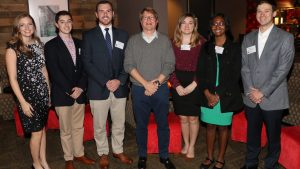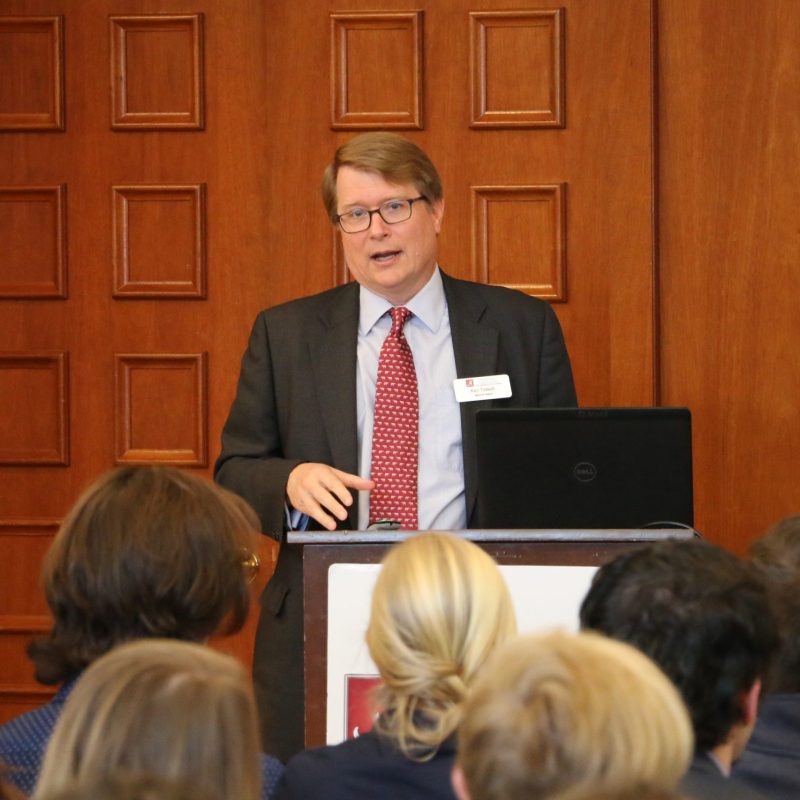First-Generation Culverhouse Alum Turns World Traveler, International Businessman, Investor in Student International Education
In 1988, Ken Tidwell quit his Wall Street job to travel the world for 18 months. He spent four months in Asia, four in South America. He spent time in the western United States, time in Europe. And at the end of the 18 months, he was out of money but rich with a new insight: he wanted to work outside of the US. He wanted to pursue international business.
The child of a blue-collar family in Jasper, a rich farming history on both sides, neither parent having attended college, Tidwell felt the expectation early that he would go to college. He can trace his family tree back to the first census of Alabama (early 1800s), but rarely traveled outside of his hometown as a child. As far as college options go, the avid Alabama fan, a devotee of Bear Bryant, saw no other real choice but the Capstone. After all, it was only 60 miles away.
He landed on a business major after several tries. Engineering, by his recollection, lasted a day. Tidwell had almost settled on corporate law when he happened to meet Jim Rogers, the Demopolis-raised Wall Street tycoon who had made his fortune with the Quantum Fund and George Soros. Rogers had offered to come to Tuscaloosa to teach a class on securities analysis, which he was also doing at Columbia University. He interviewed students and profs who wanted to audit the class, hand-picking his constituents. “He worked us to death,” Tidwell laughed. Nights, weekends. Sometimes class would last twelve hours a day, then students might not see Rogers for a month. He assigned each student an industry to research, and each had to make stock recommendations based on this. “You never knew when he would call on you,” Tidwell said. He chuckled again. “It was the best class I ever had.”
After the class was over, Rogers invited the survivors to his New York brownstone for Christmas break. Tidwell abandoned his law plans and went. “I will not get anybody a job,” Rogers warned, but he did offer to make introductions and set up informational interviews. Tidwell doggedly interviewed and interviewed, and finally landed his first Wall Street job with Salomon Brothers. He worked there for two years.
Then, he left to travel the world for 18 months, visiting China, Hong Kong, Taiwan, Malaysia, and Thailand in Asia; and Ecuador, Bolivia, Peru, Argentina and Chile in South America.
Tidwell returned to the U.S. with no foreign language skills, but a firm desire to move into international business. He went to work for Citizens & Southern Bank in Atlanta as a corporate banker, figuring it would take a few months to move into the international side. Instead, it took four years. In the meantime, he met his future wife, Anne Tierney
In 1993, the North American Free Trade Agreement (NAFTA) was passed, paving the way for easier trade relations with Mexico, and Tidwell volunteered to go. He knew the business, and he could learn Spanish. So as six-month newlyweds, Tidwell and his wife moved to Mexico City. He attended language training at UNAM (University of Mexico) for two years; he left Citizens & Southern to go to work for Citibank; he and Anne had their three children. All told, the Tidwells lived in Mexico City for seven years. “Latin America became my thing,” he said.
While with Citibank, Tidwell and his family moved to Geneva, Switzerland in late 1999 to manage the Latin American team from the firm’s European offices. His last two years with Citibank were in Miami, Florida, from 2003-2005. Then the Carlyle Group called. Carlyle wanted to start investing in the Latin American markets, and they wanted Tidwell to lead the charge in finding investors there. He moved to Washington D.C., to start the department from scratch. In 2010, the Tidwells decided to move back to Santiago, Chile to head up operations closer to the client base.
Several years ago, the Manderson Executive MBA cohort took a trip to Santiago. Tidwell, who was still living there at the time, met the students for a coffee, and it “struck a chord.” This kind of education was valuable. After all, he reasoned, there is a lot of international business coming in and out of Alabama. He started thinking about ways to help.
So the Tidwells started a study abroad scholarship program at Culverhouse, and funded it: the Tidwell-Lovett Family Endowed Scholarship for the Study Abroad Program at Culverhouse. Lovett is Tidwell’s mother’s maiden name; the scholarship is dedicated to his parents’ hardworking, blue-collar and farming families, and all they accomplished. The scholarships would be awarded every year. In the past Tidwell has offered to interview finalists to give them practice, and he often has dinner with the students after they come back from their trips. “I learn stuff all of the time through these interactions,” he said.

Being a first-generation college graduate himself, Tidwell also wanted to help first-generation students get international business experience. He started investing in the one-week spring break program for first-generation college students at Culverhouse. Last year, the students went to Panama. Tidwell, who does a great deal of business, and has many contacts in Panama, arranged the day’s itinerary and hosted the students. He set them up meetings with CEOs to expose them to local and multinational companies. Through a colleague, he gained access to Smithsonian research facilities in Panama, and went with the students on their trip there. He hosted them for dinner. And now, he is helping that program financially. A second trip to Panama is planned for March, 2023.
Today, Tidwell leads his Washington, D.C. team remotely from Charleston, South Carolina, where his wife is from. He remains passionate about exposing business students to international business. “I think one of the biggest things would be to take the fear out of international travel, business,” he reflected. “We’re blessed in this country–we have a huge country. It’s autonomous. We’re not as dependent as other countries. Because of that, we’re kind of insular. The basic outlook for most Americans is, ‘it’s dangerous out there,’ both physically and business-wise.”
But Tidwell, having traveled the world and done business in multiple countries, knows better.
“Not only is it not something to be feared, but at a basic level, we’re all the same,” he said. “Everybody wants to provide for their family, have a nice home. These are basic human desires.” He recalled taking a group of Chilean investors to Mumbai, India, and Singapore in November 2022. He saw as many similarities as differences between the groups. “Once you get past superficial differences, business is business,” Tidwell said. “Everywhere.”
Invest in a first-generation student’s international business education. Contact Nick Foster, Senior Director of Development at Culverhouse, at nfoster@culverhouse.ua.edu to learn more.

